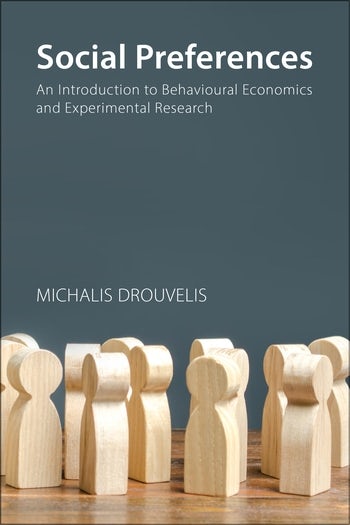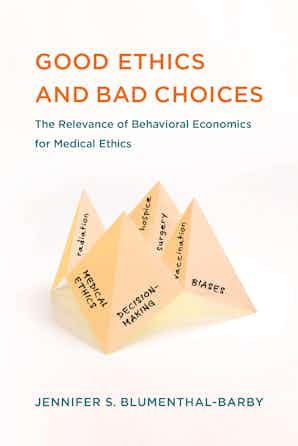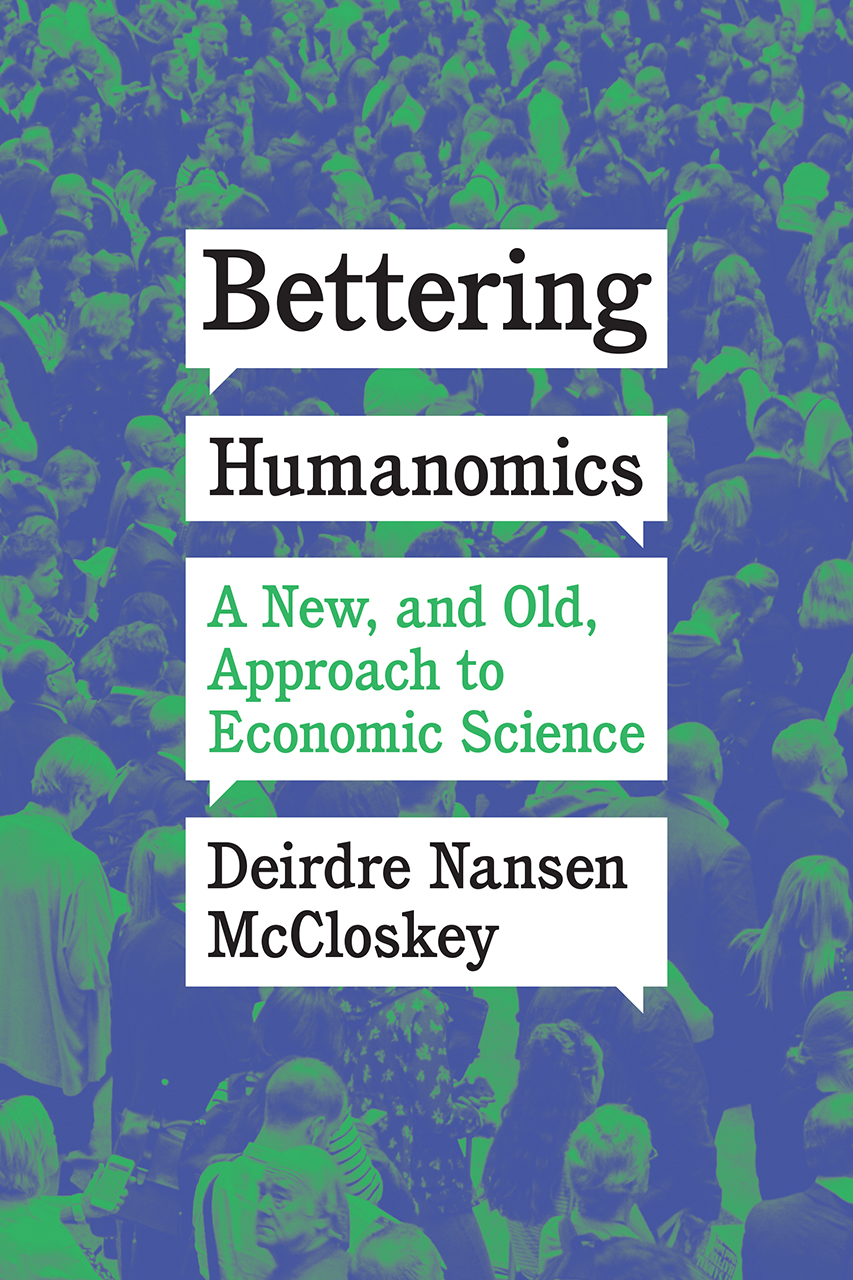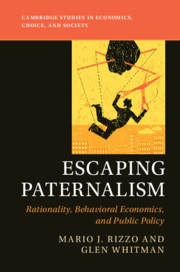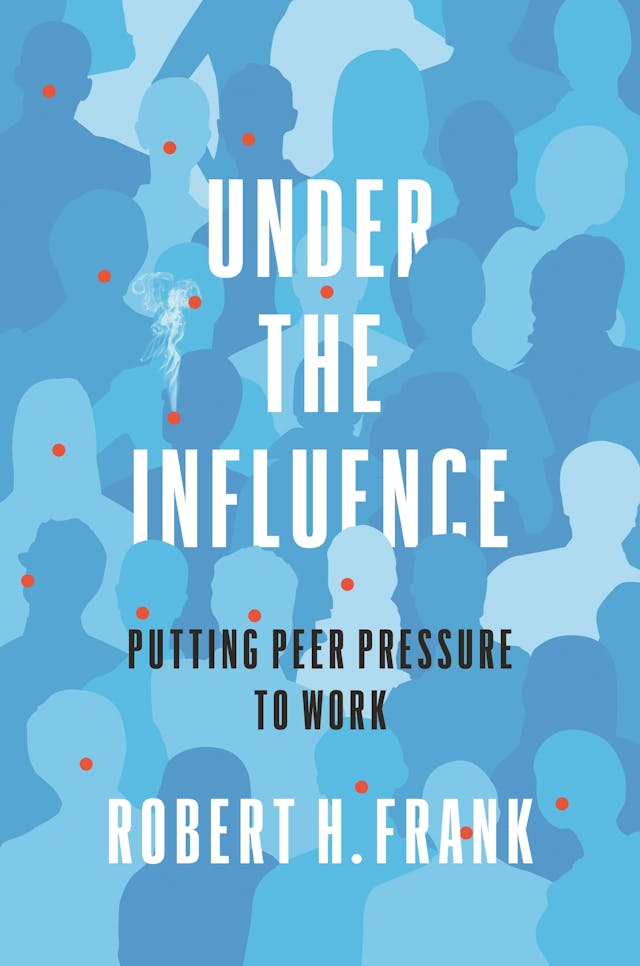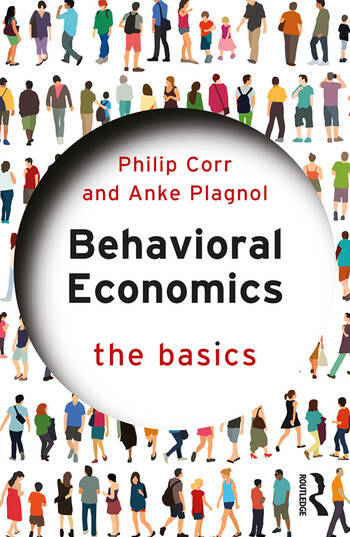Bettering Humanomics. A New, and Old, Approach to Economic Science
Podcast
The discoveries I have made by responding critically, yet as amiably as I could manage, are two:
1. There seems to be emerging a new and I think more serious and sensible way of doing economic science—quantitatively serious, philosophically serious, historically serious, and ethically serious, too, as I argue in this volume. The economist Bart Wilson and a few others nowadays call it the “humanomics,” as in the title here.4
2. But, I argue in the other volume, neoinstitutionalism, from Douglass North and Daron Acemoglu and many other economists and political scientists, is not the way forward. Scientifically speaking, its factual claims, like those of the other recent neobehaviorist fashions, such as neuroeconomics and behavioral finance and happiness studies, are dubious—or, at best, questionably founded and argued. The neoinstitutionalists, like the others, do not listen, really listen, to the evidence of humans, or to their friends’ scientific questions and objections. Substantively, they treat creative adults like a flock of little children, terrible twos, to whom we need not listen. We need, they say, merely to “observe their behavior,” omitting for some reason linguistic behavior. And then we record the behavior in questionable metrics. The children-citizens will be pushed around with “incentives,” beloved of Samuelsonian economists and econowannabes. From a great height of fatherly expertise in discerning and designing Max U institutions, the neoinstitutionalist looks down with contempt on the merely human actions and interactions of free adults.
A key book by controversial Deirdre McCloskey, this is the outline:
Part I. The Proposal
Chapter 1. Humanomics and Liberty Promise Better Economic Science
Chapter 2. Adam Smith Practiced Humanomics, and So Should We
Chapter 3. Economic History Illustrates the Problems with Nonhumanomics
Chapter 4. An Economic Science Needs the Humanities
Chapter 5. It’s Merely a Matter of Common Sense and Intellectual Free Trade
Chapter 6. After All, Sweet Talk Rules a Free Economy
Chapter 7. Therefore We Should Walk on Both Feet, Like Ludwig Lachmann
Chapter 8. That Is, Economics Needs Theories of Human Minds beyond Behaviorism
Part II. The Killer App
Chapter 9. The Killer App of Humanomics Is the Evidence That the Great Enrichment Came from Ethics and Rhetoric
Chapter 10. The Dignity of Liberalism Did It
Chapter 11. Ideas, Not Incentives, Underlie It
Chapter 12. Even as to Time and Location
Chapter 13. The Word’s the Thing
Part III. The Doubts
Chapter 14. Doubts by Analytic Philosophers about the Killer App Are Not Persuasive
Chapter 15. Nor by Sociologists or Political Philosophers
Chapter 16. Nor Even by Economic Historians
Resum amb IA
El llibre "Bettering Humanomics: A New, and Old, Approach to Economic Science" de Deirdre Nansen McCloskey proposa una nova aproximació a la ciència econòmica anomenada "humanomics". Aquesta perspectiva accepta els models, les matemàtiques, l'estadística i els experiments de l'ortodòxia econòmica actual (circa 2021), però hi afegeix la immensa informació que es pot obtenir sobre l'acció humana en l'economia a partir de les nombroses formes de parla humana. McCloskey argumenta que els economistes haurien de considerar evidència provinent de fonts diverses com les notícies, la retòrica en experiments controlats, el testimoni de gent de negocis, la xafarderia, els experiments interespecífics, la política, les reflexions ètiques i epistemològiques, les històries dels historiadors, les reflexions dels teòlegs, les introspeccions de poetes i filòsofs, les enquestes d'opinió pública i la saviesa de les arts visuals. En resum, la idea central és que els economistes haurien d'utilitzar tota l'evidència disponible per ser científics seriosos.
McCloskey sosté que l'economia, com altres ciències i com la resta de la vida d'una espècie parlant, té una "retòrica", és a dir, utilitza metàfores, històries i epistemologies. L'autora va escriure una trilogia durant els anys 80 i 90 sobre aquest tema, urgint els economistes a ser conscients de la seva retòrica per tal de desenvolupar una ciència madura. Amb aquest nou llibre i el seu acompanyant, "Beyond Behaviorism, Positivism, and Neoinstitutionalism in Economics", McCloskey va més enllà de la forma de la ciència econòmica per centrar-se en l'objecte substantiu: l'economia mateixa té una retòrica.
La proposta de "humanomics" defensa que una ciència econòmica millor ha de tenir en compte la parla i la ment humana més enllà del conductisme. L'autora critica el que anomena "nonhumanomics", que il·lustra amb problemes en la història econòmica. Argumenta que l'economia necessita teories de la ment humana que vagin més enllà del simple conductisme. McCloskey aprèn tant de Faust com de l'arbitratge de la paritat de tipus d'interès cobert, subratllant l'ampli espectre de l'aproximació "humanomics".
Una part crucial de "humanomics" és la importància de la "sweet talk" (conversa amable) en una economia lliure. McCloskey presenta dades empíriques que suggereixen que aproximadament una quarta part de la renda salarial en una societat de gent lliure prové de la persuasió burgesa i femenina, no d'ordres o informació. Posa exemples de diverses professions on una part significativa del temps es dedica a persuadir, des de advocats i jutges fins a directius i professors. Aquesta persuasió és el que fa funcionar el rellotge econòmic. L'economia formal de la màxima utilitat no pot explicar la "sweet talk", tot i que aquesta és de gran importància.
La "killer app" (aplicació estrella) de la "humanomics" és l'evidència que el Gran Enriquiment (l'augment significatiu de la riquesa des de 1800) va sorgir de l'ètica i la retòrica, i no principalment de l'acumulació de capital o l'explotació jeràrquica. McCloskey argumenta que la dignitat del liberalisme, la idea d'honrar socialment totes les persones, juntament amb la llibertat per entrar en nous oficis i protegir la llibertat econòmica, van ser necessàries i suficients per encoratjar la innovació i el creixement. Són les idees, no els incentius per si sols, els que subjacen a aquest enriquiment. El canvi crucial cap al 1700 va ser un clima de persuasió que va portar a la reflexió, l'emprenedoria i el pluralisme del món modern.
McCloskey fa referència a l'obra d'Adam Smith com un practicant primerenc de la "humanomics". El seu primer llibre, "La Teoria dels Sentiments Morals" (1759), tracta sobre com conversem sobre l'ètica, especialment la virtut de la temprança. Fins i tot a "La Riquesa de les Nacions" (1776), Smith menciona la importància de la persuasió en la divisió del treball.
El llibre també aborda dubtes i crítiques a la "killer app" per part de filòsofs analítics, sociòlegs i historiadors econòmics. McCloskey respon a aquestes objeccions, defensant la importància de la "humanomics" i la seva capacitat per explicar el Gran Enriquiment millor que les explicacions materialistes o institucionalistes. Per exemple, critica la visió de Douglass North i els neoinstitucionalistes per negligir el paper autònom de les idees i la retòrica. També respon a les crítiques sobre la manca de definició de "llibertat" o "dignitat humana" i la suposada falta d'atenció a la desigualtat, argumentant que aquests temes es tracten en la trilogia sobre l'Era Burgesa i en altres treballs.
En conclusió, "Bettering Humanomics" proposa una reorientació de la ciència econòmica cap a una perspectiva més humanista que integri la parla, la retòrica, l'ètica i les idees com a factors crucials per comprendre el funcionament de l'economia i, especialment, les causes del Gran Enriquiment. L'autora convida els economistes a escoltar realment la conversa humana per tal de millorar la seva comprensió del món econòmic.


